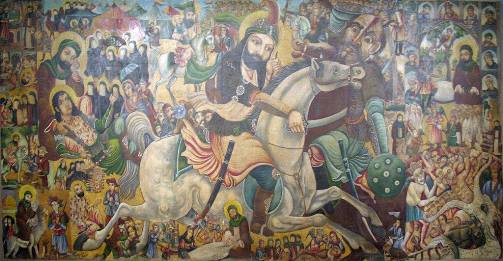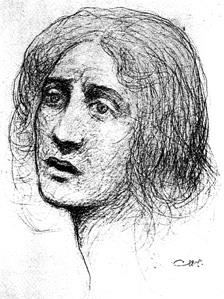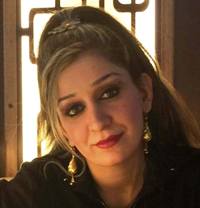صحيفة المثقف
Adversities
![]() ترجمة للإنجليزية
ترجمة للإنجليزية
لقصيدة الشاعرة زينب العابدي المعنونة: الشدائد
Adversities / ترجمة: إنعام الهاشمي
توطئة
في الشعرِ المعاصرِ العراقيّ وفي وسَطِ الحَداثةِ التي تُنتِجُ العَديدَ مِن الشُعراء، وخاصَّةً مِن النِساءِ، عِبرَ قصيدَةِ النثرِ، لا نجدُ اليومَ مَن يَكتُبُ القصيدةَ العمودِيَّةَ الكلاسِيكِيًّةِ إلاّ ما نَدَر. وزينب العابِدي مِن الشاعِراتِ المُعاصِراتِ القلائِلِ اللواتي يكتُبنَ الشِعرَ العَمودِيّ الكلاسيكِي . وفي هذا أجِدُها تقِفُ بتفَرُّدٍ وبمعزَلٍ عن الشاعِراتِ اللواتي اقرأُ لهنَّ في كلِّ مَكانٍ في الَنت وبِتكاثُرٍ انشطارِيٍّ سَريعٍ في قَصيدَةِ الَنثرِ أو ما شابَهَها. ورغمَ أني أتجنَّبُ ترجَمةَ القصائِدِ الكلاسِيكِيَّةِ إلّا انني جازفتُ وترجَمتُ قصيدتَها هذه، وهي العَمودِيَّةُ الثانِيةُ التي تدخلُ كتابَ ترجماتِي المُعَنوَنُ “Tapestry of Contemporary Iraqi Poetry” ذلكَ لإعطاءِ القارِئ نكهةً أخرى للشِعرِ المُعاصِرِ الذي هي جزءٌ منهُ رغمَ أنها كُتِبَت بأسلوبِ الشِعرِ الكلاسِيكِيّ.
معضِلةُ الشِعرِ الكلاسِيكيِّ الأزَلِيَّةُ تبقى قائِمَةً في تمَسُّكِهِ وخُضوعِهِ للقافِيةِ والبُحورِ وتغلُّبِ الشَكلِ على المُحتوى مِمّا يَحِدُّ مِن حُرِيَّةِ الشاعِرِ في التوَسُّعِ بالاستِعاراتِ والصُوَرِ الشِعرِيَّةِ التي يُمِليها المُخَيَّلُ الشِعرِيُّ كما في الشِعرِ الحَداثَوِي. فالوزنُ والقافِيَةُ واستِعمالُ المُفرَداتِ اللغَوَيَّةِ الكلاسِيكِيًّةِ لابُدَّ وأن يّحِدَّ مِن قابِلِيَّةِ الشاعِرِ في التَصَرُّفِ، ولابُدَّ فيه مِن التَضحِيَةِ بِبَعضِ المَعانِي مِمّا يُؤثِّرُ على إمكانِيَّةِ المُتَرجِمِ في نَقلِ المَعنى والصورَةِ التي يَصبو الشاعِرُ لإيصالِها للمتلقِّي، وبالتالِي يأخُذُ مِن المَساحَةِ الجَمالِيَّةِ التي يَجِبُ أن تَتَوَفَّرَ في الشِعر.
ومِن مُعضِلاتِ الترجَمَةِ الأخرى التي يجابِهُها المُتَرجِمُ، في الشِعرِ في الكلاسِيكيِّ كما في الحَداثَوي ولكن بصورَةٍ أكثرَ احتِمالية في الكلاسِيكِي، تكمُنُ في استِعمالِ الشاعِرِ لتعابيرَ لُغَوِيَّةٍ قد يكونُ فيها جَمالِيَّةُ بَلاغِيَّةٌ بِلُغَتِها الأصلِيَّةِ لا تحمِلُها مُرادِفاتُها في اللُغةِ الأخرى. كما وإن استِعمالَ الشاعِرِ لرُموزٍ لها مَدلولاتُها التاريخِيَّةُ والحَضارِيَّةُ المَألوفةُ مَحَلِّيَّاً، والتي قد لا تَعنِي الكثيرَ للقارِئِ في الضَفَّةِ الأخرى، يُشَكِّلُ مُشكِلَةً أخرى للمُتَرجِم. ففي هذهِ الحالَةِ يُجابِهُ المُتَرجِمُ ضَرورَةَ تزويدِ القارِئ الآخر بالتوضيحاتِ بإضافِةِ الهَوامِشِ للنِصِّ المُتَرجَم. ولا شَكَّ أنَّ كَثرَةَ الهَوامِشِ مِن شأنِها أن تُشَوِّشَ قارِئَ الشِعرِ وتشغَلَهُ عَن جَمالِيَّةِ النَصِّ بقيمَتِهِ المَعرِفِيًّة. وبذا تصبحُ القِطعَةُ المُتَرجَمَةُ وكأنّها درسٌ مَعرِفِيّ. وهذا لا يخلو مِن فائِدةٍ في نَقلِ الإرثِ الحَضارِيِّ او التاريخِيِّ إلى الضَفّةِ الأخرى غير ان قارِئ الشِعر لا يؤمُّهُ بهَدَفِ الاستِماعِ لدرسٍ مَعرِفِيًّ وإنما بهَدَفِ الاستِمتاعِ بالجَمالِيَّةِ الشِعرية على الأغلَب. والمترجِمُ هنا يفرضُ خياراتَهُ على القارِئ ويقدِّمُ له طبقاً فيه ما لم يَكُن يَتَوَقَّعهُ.
هذه القصِيدةُ حفلًت بالرُموزِ التاريخِيَّةِ التي ترتبِطُ ارتِباطاً وثيقاً بالصُوَرِ والمَشاهِدِ التي تَتَطَرَّقُ لها القصيدةُ وما ورائِها مِن مَشاعِر. ورغمَ ذلكَ فقد قرَّرتُ ترجَمَتَها وإضافَةَ الهَوامِشِ، وبذا كانِت الترجَمَةُ مزيجاً مِن المادَّةِ الأدبِيَّةِ والمادَّةِ المَعرِفِيَّة. وبَعدَ انتهائِي مِن التَرجَمَةِ شَعَرتُ وكأنَّني أقدِّمُ للقارئِ الآخر درساً في تاريخِ واقِعةِ كربلاء والتي تعيدُها للأذهانِ هذهِ القصيدةُ بذِكرِ شخصياتِها وربطِها مع الأحداثِ التي يمُرُّ بها العِراقُ والمَصِيرِ الكارِثِيِّ الذي تَتَعَرَّضُ لهُ المَرأةُ بالذات، فهي التي تَتَحَمَّلُ نتيجَةَ الكَوارِثِ التي تُخَلِّفُها الِنزاعاتُ والحروب، وهي التي إن لم تَمُت بالسَيفِ كما يموتُ الرِجالُ قد تموتُ كَمَداً وحُزناً ولا تَنجو مِن هذا المَصيرِ لا الطِفلةُ ولا المرأةُ البالِغةُ مَهما حَمَلَت مِن الجَلَدِ والصَبرِ والشَجاعَة. وقد عبَّرَت الشاعِرةُ زينب العابدي عَن ذلكَ الحُزنِ الذي يلفُّ حياتَها وحَياةَ المَرأةِ العِراقِيَّةِ عُموماً بذكر كلِّ رموزِ الحزنِ النسائِيِّ في واقِعَةِ كربلاء وبرَفضِها لاستمرارِ وجودِ الخنساءِ رمزاً للرِثاءِ في أشعارِها والذي يُضرَب به المثل في شَجاعةِ المرأة وبطولتِها في تقُّبلِ الموتِ والتعبير عنه بالرثاء، ُ كما جاءّ في خاتِمَةِ قصيَدتِها:
إلى متى ومتى الخنساء تصحبنا
ثوب البطولة ما قد عدت احتمل
أريد آما إذا نبكي تحاوطنا
ونحن إخوة أحزان لها وصلوا
أريد دارا بلا دمع يحاوطها
عمرا أريد فلا حزن وﻻ جدل
............................
Adversities
Arabic poem by: Zainab Al-Abidy*
Translated into English by:
Inaam Al-Hashimi (Gold_N_Silk)
Ever since I was born, hardship has narrowed my ways;
i kept growing while all dimensions were reduced.
Till I became content with a hint of ray in the darkness,
in hope for the glimmer, like the face of a full moon, be complete.
The Euphrates, with the bell of my prayers,
chanted the prayer kneeling and rising in adoration.
I’ve sent messages to the horizon
where the south, with the taste of salt, has lined its eyes.
Ever since I was born, the same garment surrounded me;
with the characters of death fighting in its eyes.
I tried to be fair, but it kept me buttoned
as though, around my life, old gallows stand erect.
The white in the garment was telling me:
“To be shrouded by the hours is possible."
Even as my braids are inhabited with the taste of graying,
they, towards eulogizing, migrate like birds
O source of purity, O AzZahra 1 of our virtue,
to your likes, I trust my grievance.
Women in my homeland have no colors;
like water they flow, but they ignite in it.
Hussein 2is back with “Tifoof” in our cities;
The captives are us; we are the medicine and we are the illness too.
The Sukainas 4 are cries in our convoys
calling for help amidst beheadings of the innocent.
And so many “Roqayas” 5 had their fathers’ heads severed,
with the lump of death, in their eyes, complying.

Battle of Karbala - Abbas Al-Musavi – overal (1868-1933) - Brooklyn Museum
They say:
They prepare to be embraced by the face of the unseen;
I say:
Life is complete only after death.
Iraq, all in all,
the land, the house, the palm tree,
the family, the child, the neighbor and the mates,
the seashores, the rivers and all hopes are captives.
Nothing to remember, but grief, in my homeland;
thousands of hands on the shores attest to that.
A thousand “Zainabs” 6 called in the silence of their souls;
Arise, O Muhammad 7 , and comfort these eyes.
The ways of “al Shimr” 8 have raped our maidens;
The jewels are being sold cheap in the bazaars.
I have seen herds of sheep crucifying us,
As though heroism is crucified in plainness;
I saw my house with no walls raising it
as childhood and dreams had departed it.
I saw my mother’s coffin in procession,
with no sons mourning her;
They raced her to the Lord,
and passed away before she did.
How long would the “Khansaa” 9 be with us?
I cannot bear the garment of heroism anymore.

Al Khansaa: by Gibran Khalil Gibran
I want a mother to embrace us when we cry;
We, the brothers of sorrow, have arrived.
I want a home with no tears around;
I want a life with no contention,
and no one ever sad.
* * *
الشدائد

زينب العابدي
مذ ان ولدت وقد ضاقت بي السبل
فرحت أكبر والأبعاد تختزل
حتى ارتضيت بصيص العتم بارقة
عل البصيص كوجه البدر يكتمل
كان الفرات على ناقوس أدعيتي
يشدو الصلاة ويرقى ساجدا يصل
وكنت أبعث مرسالا الى افق
حيث الجنوب بطعم الملح يكتحل
مذ ان ولدت وعين الثوب يلبسني
في مقلتيه حروف الموت تقتتل
حاولت أعدل والأزرار تغلقني
مثل المشانق حول العمر تمتثل
كان البياض بذاك الثوب ينبئني
إن التكفن بالساعات محتمل
حتى الضفائر طعم الشيب يسكنها
صوب المراثي كالأطيار ترتحل
يا منبع الطهر يا زهراء عفتنا
اني لمثلك في شكواي اتكل
كل النساء بلا لون لدى بلدي
ماءً تسيل ولكن فيه تشتعل
عاد الحسين طفوفا في مدائننا
والسبي نحن ونحن الطب والعلل
إن السُكَينات صوت في قوافلنا
تغتاث نحرا بغير الذنب ينجدل
وكم رقية قدت رأس والدها
وغصة الموت في الاحداق تمتثل
قالوا تهيئ وجه الغيب يحضنها
قلت الحياة بظهر الموت تكتمل
كل العراق سبايا في مرابعه
الارض والدار والأهلون والنخل
الطفل والجار والأصحاب قاطبة
حتى الشواطئ والأنهار والأمل
ﻻشيء أذكر إلا الحزن في بلدي
فألف كف على الشطآن تمتثل
وألف زينب نادت في سريرتها
قم يا محمد حرّى هذه المقل
فمنهج الشمر قد عادى حرائرنا
ﻵلئ الدرّ في الأسواق تبتذل
كم قد رأيت نعاج الجر تصلبنا
صلب البطولة لو بالزهد تتصل
رأيت داري ﻻ جدران ترفعها
فيه الطفولة والأحلام قد رحلوا
ونعش أمي بلا ابن يشيعها
قد سابقوها جوار الرب وانتقلوا
إلى متى ومتى الخنساء تصحبنا
ثوب البطولة ما قد عدت احتمل
أريد آما إذا نبكي تحاوطنا
ونحن إخوة أحزان لها وصلوا
أريد دارا بلا دمع يحاوطها
عمرا أريد فلا حزن وﻻ جدل
..............................
1-az-Zahra' az-Zahra : Fatimah az-Zahra was the daughter of the Islamic prophet, Muhammad, and is greatly revered by Muslims, often under the extended name Fatimah az-Zahra' , Arabic: الزهراء فاطمة
2-Hussein: al-Husayn ibn Ali ibn Abi Talib (Arabic: الحسين بن علي بن أبي طالب; 11 January 626 CE – 10 October 680 CE) (3rd / 4thSha'aban 4 AH – 10th Muharram 61 AH), sometimes spelled Hussein, was the son of Ali ibn Abi Talib (fourth Rashidun Caliph of Sunni Islam, and first Imam of Shia Islam) and Fatimah az-Zahra (daughter of Muhammad) and the younger brother of Hasan ibn Ali. al Husayn is an important figure in Islam, as he is a member of the Ahl al-Bayt (the household of Muhammad) , as well as being the third Shia Imam. al Husayn is highly regarded by Shiite Muslims because he refused to pledge allegiance to Yazid I, the Umayyad caliph because he considered the rule of the Umayyads unjust. As a consequence, he left Medina, his home town, and traveled to Mecca. There, the people of Kufa sent letters to him, asking his help and pledging their allegiance to him. So he traveled towards Kufa (in what is known now as Iraq). At Karbala his caravan was intercepted by Yazid I's army. He was killed and beheaded in the Battle of Karbala in 680 (61 AH) by Shimr Ibn Thil-Jawshan, along with most of his family and companions.The annual memorial for him, his family, his children and his companions is called Ashura (tenth day of Muharram) and is a day of mourning for Shiite Muslims. The killings at Karbala fueled the later Shiite movements. Anger at Huseein's death was turned into a rallying cry that helped undermine and ultimately overthrow the Umayyad Caliphate.
3- Plularization of Al-Taff, in reference to the Battle of Karbala (also referrded to as Al-Taff incident)
4- Sukainas: Pluralization of “Sukaina”, the daughter of al Hussein ibn Ali and the granddaughter of the Prophet Muhammad (PBUH). She was taken a captive to Damascus after the killing of her father in the Battle of Karbala, and died of grief a year later.
5- Ruqayas: Pluralization of Roqaya : The daughter of al Hussein bin Ali bin Abi Talib (57 e - 61 e), and the granddaughter of the Prophet Muhammad (PBUH). At the age of five, and after her father was killed and beheaded, by the army of Yazid, in the Battle of Karbala, she accompanied the rest of the captives to Damascus. Not knowing of his death, she kept crying all the time and asking for her father. One night she woke up disturbed and kept crying after seeing him in a dream. Yazid woke up disturbed by her crying and ordered her father’s head be brought to her. She held the head and kept crying till she died.
6- Zainabs: Pluralization of Zainab bint Ali, The courageous and eloquent sister of al Hussein . She accompanied him, with all her sons, and lived through the Battle of Karbala to see all her brothers and sons and the rest of their companions killed and beheaded. She was then taken captive to Damascus with the rest of the women and survivors after the battle. She was known in history for he eloquent speech rebuking Yazid, while in his captivity, for killing the grandchildren of the Prophet Mohammed and humiliating the women of his household by taking them captives.
7- Mohammed (PBUH) : is the Islamic prophet
8- Al Shimr : Shimr Ibn Thil-Jawshan the one who killed and beheaded al Hussein in the Battle of Karbala. He is abhorred by all Muslims for his evil ways.
9- Al Khansa: Tumadir bint Amr ibn al-Harth ibn al-Sharid al Sulamiyah (Arabic: تماضر بنت عمرو بن الحرث بن الشريد السُلمية ), usually simply referred to as al-Khansa’ (Arabic: الخنساء) , was a 7th-century Arabic poet (said to have died in 646 CE). She was born and raised in Najd (the central region of modern-day Saudi Arabia). She was a contemporary of Prophet Muhammad, and eventually converted to Islam. In her time, the role of a female poet was to write elegies for the dead and perform them for the tribe in public oral competitions. Al-Khansa’ won respect and fame in these competitions with her elegies for her brothers, Sakhr and Muʿawiyah, who had died in battle. She is the best known female poet in Arabic literature.














